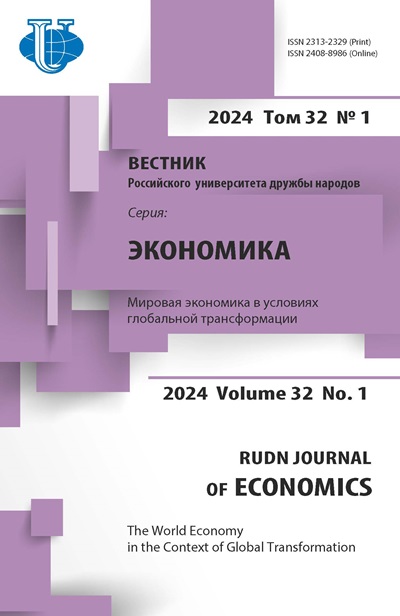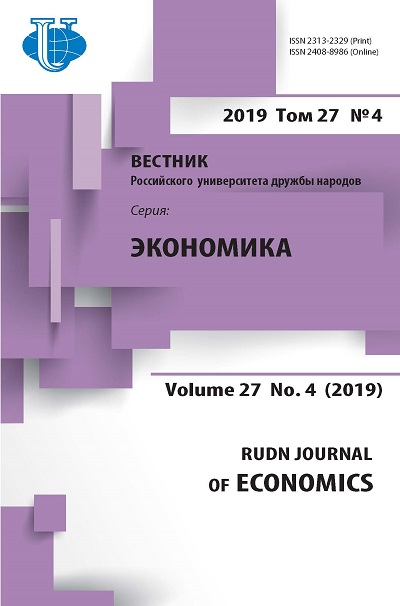Calculation of the amount of funding for world-class research centers depending on the amount of work performed
- Authors: Zolotaryov D.V.1, Belov F.D.1
-
Affiliations:
- The Russian Research Institute of Economics, Politics and Law in Science and Technology
- Issue: Vol 27, No 4 (2019)
- Pages: 636-644
- Section: MANAGEMENT AND MARKETING ISSUES
- URL: https://journals.rudn.ru/economics/article/view/23403
- DOI: https://doi.org/10.22363/2313-2329-2019-27-4-636-644
Cite item
Full Text
Abstract
This article presents the methodology recommended by the authors for calculating the amount of grants provided from the federal budget in the form of a subsidy for state support for the creation and development of world-class research centers, including international mathematical centers and world-class research centers that carry out research and development on the priorities of scientific and technological development. The methodology involves the distribution of the grant to world-class research centers, depending on the volume of work performed. This is relevant in that at the moment, grants are distributed evenly between world-class research centers every year, and therefore there is no incentive for the centers to intensify work in order to achieve higher values of performance targets. The article thoroughly disclosed the logic of the proposed methodology, presented calculation formulas with explanations. The article discusses the implementation of the tasks of the national project “Science” in terms of creating world-class research centers. The number of centers created in 2019, their types and directions of scientific activity, as well as the number of world-class scientific centers that will be created in subsequent years are indicated in this article. Target performance indicators of the created centers and planned achievements by 2024 are presented. In conclusion, the data presented in the article are summarized, and the positive prospects for Russian science resulting from the creation and functioning of world-class research centers are examined. The conclusion also indicates how the technique developed by the authors can stimulate world-class research centers to fruitful scientific activity.
About the authors
Dmitry V. Zolotaryov
The Russian Research Institute of Economics, Politics and Law in Science and Technology
Author for correspondence.
Email: zolotarev@riep.ru
PhD, Deputy Director, The Russian Research Institute of Economics
20A Dobrolubova St., Moscow, 127254, Russian FederationFilipp D. Belov
The Russian Research Institute of Economics, Politics and Law in Science and Technology
Email: belov@riep.ru
PhD, researcher, The Russian Research Institute of Economics
20A Dobrolubova St., Moscow, 127254, Russian FederationReferences
- Fedoseeva, V.A. (2019). Finansovo kreditnaja komponenta innovacionnoj infrastruktury regionov Rossii: problemy funkcionirovanija i puti ih reshenija [Financial credit component of the innovation infrastructure in Russian regions: problems and solutions]. Saint Petersburg State Polytechnical University Journal. Economics, (1), 70–84. (In Russ.)
- Kazhuro, N.Y. (2015). Konkurenciya kak mekhanizm rynka [Competition as market mechanism]. Science and technique, (4), 77–84. (In Russ.)
- Klochkov, V.V., & Rozdestvenskaya, S.M. (2018). Molodezhnye granty kak sredstvo upravlenija razvitiem nauki: analiz jeffektivnosti [Youth grants as a means of scientific development management: analysis of efficiency]. Problems of management, (3), 8–16. (In Russ.).
- Loktionova, Yu.N., & Yanina, O.N. (2019). Podhody k izmereniju innovacij v jekonomike [Approaches to Measuring Innovation in the Economy]. Social policy and sociology, 1(160), 32–41. (In Russ.)
- Varshavskij, A.E. (2017). O strategii nauchno-tekhnologicheskogo razvitiya rossijskoj ekonomiki [On the strategy of scientific and technological development of the Russian eco- nomy]. Society and economy, (6), 5–27. (In Russ.)















